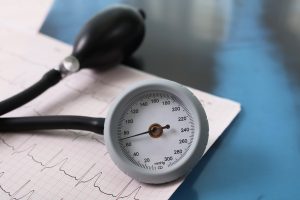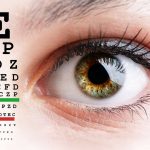![vertigo[1]](https://howfacecare.com/wp-content/uploads/2017/10/vertigo1-300x220.jpg) Sudden dizziness is a condition characterized by a false sense of rotation of your body or objects around, as well as the illusion of losing the fulcrum. Often, it is accompanied by weakness, imbalance, nausea, darkening in the eyes, slowing (increasing) the rhythm of the heart.
Sudden dizziness is a condition characterized by a false sense of rotation of your body or objects around, as well as the illusion of losing the fulcrum. Often, it is accompanied by weakness, imbalance, nausea, darkening in the eyes, slowing (increasing) the rhythm of the heart.
The reasons for this phenomenon lie in failure in the system of monitoring the position of the body in the surrounding space. It consists of the vestibular apparatus, the visual analyzer and the muscle receptors. Its functioning is coordinated by the brain.
There are many kinds of dizziness. But to understand its prerequisites the most significant is the classification of the peripheral and central. The first is associated with diseases of the vestibular apparatus, and the second – with the pathologies of the brain and systemic ailments. In addition, there are a number of physiological reasons leading to a short-term feeling of weightlessness.
Contents
- Reason number 1: Functional reasons
- Reason number 2: Arterial pressure
- Reason number 3: Diseases of the vestibular apparatus and ears
- Reason number 4: Diseases and trauma of brain
- Reason number 5: Diseases of the heart, blood vessels and other pathologies
- Reason number 6: Diseases of the gastrointestinal tract
- Reason number 7: Problems with the spine, disturbing the cerebral circulation
- Reason number 8: Premenstrual syndrome in women
- Reason number 9: Psychogenic reasons
- Reason number 10: Pregnancy
- What to do if felt sudden dizziness: First Aid
- Video
Reason number 1: Functional reasons
![8-53[1]](https://howfacecare.com/wp-content/uploads/2017/10/8-531-300x216.jpg) Dizziness may occur when the body position changes abruptly: when you get up after a long lying or sitting, when you suddenly turn your head or tilt, and so on. Usually it is not accompanied by unpleasant symptoms, but sometimes there is a noise in the ears and darkens before the eyes. This state lasts for a few seconds. It is the result of redistribution of blood in blood vessels.
Dizziness may occur when the body position changes abruptly: when you get up after a long lying or sitting, when you suddenly turn your head or tilt, and so on. Usually it is not accompanied by unpleasant symptoms, but sometimes there is a noise in the ears and darkens before the eyes. This state lasts for a few seconds. It is the result of redistribution of blood in blood vessels.
Causes of sudden dizziness, not associated with changes in body position or serious pathologies, are:
- overwork, lack of sleep;
- lack of nutrients during a diet;
- anemia – a decrease in the level of hemoglobin, which often occurs during pregnancy, as well as with abundant menstrual discharge.
In all these states, there is an insufficient supply of oxygen to the brain. That is why there is dizziness, weakness, loss of balance, slowing the rhythm of the heart.
Advice: Treatment should consist of normalizing the regime of the day, rest and balanced nutrition. It may be necessary to take multivitamin complexes, as well as therapy aimed at eliminating the causes of the problem. For example, when the menstrual periods are heavy, the doctor prescribes hormonal or herbal remedies.
Back
Reason number 2: Arterial pressure

Differences in blood pressure adversely affect the blood supply to the brain, so there is dizziness. Along with it, there are the following symptoms.
When the pressure is low:
- weakness, pallor;
- a feeling of lack of air;
- increased sweating;
- darkening, “flies” before the eyes;
- headache.
With the blood pressure is high:
- pain and throbbing in the temples;
- headache in the occiput or behind the sternum;
- redness of the face and a feeling of heat;
- loss of balance.
Common features:
- nausea, sometimes vomiting;
- noise in ears;
- a change in the rhythm of the heart.
Advice: The treatment of hypo- or hypertension is complex and prolonged. If pressure surges occur very rarely due to fatigue, malnutrition or stress, it is enough to drink sweet tea (with hypotension) or to take a sedative (for hypertension) to eliminate dizziness.
Back
Reason number 3: Diseases of the vestibular apparatus and ears
![heat%20on%20your%20Ear[1]](https://howfacecare.com/wp-content/uploads/2017/10/heat20on20your20Ear1-300x200.jpg) The main causes of peripheral dizziness:
The main causes of peripheral dizziness:
- Otitis is an inflammation of the middle ear. Symptoms: pain in the ear and discharge from it, fever, hearing loss. Treatment – local and systemic antibiotics.
- Vestibular neuritis is an inflammation of the vestibulocchlear nerve. Symptoms: nausea, vomiting. The peculiarity of this disease is a very strong dizziness without loss of hearing. Therapy – drugs to eliminate dizziness and nausea. The disease passes by itself.
- Ménière’s disease is the defeat of the inner ear. Symptoms: ringing, noise in the ears, temporary hearing disorders. Treatment – relief of unpleasant sensations, in severe cases – surgery on the inner ear or the use of hearing aids to manage hearing difficulties as advised by audiologists. Your ENT doctor can also determine if your dizziness was caused by tinnitus or ear infection.
There are several other pathologies associated with the ears and vestibular apparatus that lead to dizziness. Among them: labyrinthitis, neurinoma of the auditory nerve, damage to the tympanic membrane, defects in the capsule of the inner ear, and so on. They are rare.
Advice: Be attentive to listen to your body. It is possible to suspect the mentioned diseases if sudden dizziness is not accompanied by lethargy, headache, heart rhythm disturbance and other systemic signs.
Back
Reason number 4: Diseases and trauma of brain
![brain[1]](https://howfacecare.com/wp-content/uploads/2017/10/brain1-300x210.jpg) The main causes of central dizziness:
The main causes of central dizziness:
- A tumor in the brain that compresses the eighth cranial nerve. Symptoms: one-sided hearing loss, headaches. Treatment – surgical removal, chemotherapy.
- Migraine. Symptoms: a headache that occurs after dizziness. Therapy is painkillers.
- Epilepsy. Symptoms: confusion, convulsions, a violation of the rhythm of the heart. Treatment is a course of antiepileptic medicines throughout life.
- Cervical osteochondrosis: a disease affecting the disks in the cervical region. It leads to infringement of a vertebral artery and disturbance of a blood supply of a brain. Symptoms: discomfort in the cervical region, a crunch when turning the head, headache, nausea, angina, an increase in the rhythm of the heart. Therapy – exercises, massage, anti-inflammatory drugs, analgesics, chondroprotectors and so on.
- Multiple sclerosis is the defeat of the nerve fibers of the brain and spinal cord. Early symptoms: double vision, weakness of muscles, loss of balance and coordination, numbness of fingers, tingling sensation in the limbs. Treatment – corticosteroids, plasmapheresis.
- Craniocerebral trauma and congenital deformity. Symptoms: pain, nausea, vomiting, rapid or slow heart rhythm.
Advice: Never think that brain trauma may be not serious as it may lead to serious health problems if to ignore it.
Back
Reason number 5: Diseases of the heart, blood vessels and other pathologies
![cs-heart-disease-gene-large[1]](https://howfacecare.com/wp-content/uploads/2017/10/cs-heart-disease-gene-large1-300x169.jpg) Among the common causes of dizziness and nausea there is pathology of the cardiovascular system. Vertigo – an early “bell” of the onset of heart failure or angina pectoris. The same symptom is characteristic for problems with blood vessels: narrowing of the lumens with fat deposits or the formation of thrombi. With arrhythmia, the intensity of cardiac activity is uneven. Periodic fades alternate with increased myocardial activity. Vertigo in this case is accompanied by a tangible loss of control over the position of the body. Often, a faint occurs. Among other reasons for sensation of rotation and loss of balance can be identified:
Among the common causes of dizziness and nausea there is pathology of the cardiovascular system. Vertigo – an early “bell” of the onset of heart failure or angina pectoris. The same symptom is characteristic for problems with blood vessels: narrowing of the lumens with fat deposits or the formation of thrombi. With arrhythmia, the intensity of cardiac activity is uneven. Periodic fades alternate with increased myocardial activity. Vertigo in this case is accompanied by a tangible loss of control over the position of the body. Often, a faint occurs. Among other reasons for sensation of rotation and loss of balance can be identified:
Atherosclerosis of vessels. Atherosclerosis of cerebral vessels – deposition of cholesterol on the walls of blood vessels, provoking deterioration of blood circulation.
Symptoms: weakened memory and attention, decreased intelligence, fatigue. Therapy – diet, vasodilator drugs, vitamins.
Stroke – acute violation of blood supply to the brain.
Symptoms: loss, stunned consciousness, speech and coordination of movements, slowing down, and then more frequent heart rhythm, trouble with breathing, facial asymmetry and so on.
Advice: This condition is extremely dangerous for life. The first thing to do is to call an ambulance. The patient should be laid, raising his head, and provided with airflow. Problems with balance can be observed during rehabilitation after a stroke.
Back
Reason number 6: Diseases of the gastrointestinal tract
![Mothers[1]](https://howfacecare.com/wp-content/uploads/2017/10/Mothers1-300x194.jpg) There are some diseases of gastrointestinal tract, which also can cause sudden dizziness.
There are some diseases of gastrointestinal tract, which also can cause sudden dizziness.
They are the following:
- gastritis,
- hepatitis,
- pathologies of the gallbladder.
Dizziness is associated with a general intoxication of the body and a violation of absorption of nutrients.
Symptoms: problems with digestion, abdominal pain. The doctor determines the tactics of therapy after a complex diagnosis.
Advice: In case you have noticed an abdominal pain along with the dizziness, it is necessary to call an ambulance immediately.
Back
Reason number 7: Problems with the spine, disturbing the cerebral circulation
![16277_03232041_max[1]](https://howfacecare.com/wp-content/uploads/2017/10/16277_03232041_max1-300x188.jpg) The sudden weakness and dizziness occur in diseases of the upper spine:
The sudden weakness and dizziness occur in diseases of the upper spine:
- The destruction of intervertebral disc cartilages is often supplemented by an inflammatory process in adjacent tissues.
- In turn, this causes compression (compression) of nerve endings and vessels that direct oxygen and nutrients to the brain.
- Through the vertebral column, an important trunk is sent to the brain, the inferior work of which causes disturbances in the regulation of the organism as a whole.
When revealing osteochondrosis, protrusions of the intervertebral discs of the cervical region and associated “vertebral artery syndrome”, a course of non-steroidal anti-inflammatory drugs and painkillers are prescribed. Simultaneously complexes for normalization of nervous activity and means for improving the state of blood vessels should be prescribed.
Advice: To normalize the blood supply of the cartilages of the intervertebral disc, therapeutic gymnastics should be done, the exercises of which are performed during the lifetime period.
Back
Reason number 8: Premenstrual syndrome in women
![1094_LL[1]](https://howfacecare.com/wp-content/uploads/2017/10/1094_LL1-300x200.png) There are about 150 signs of premenstrual syndrome. One of the most common symptoms is dizziness, or vertigo, which occurs in 70% of cases. It significantly reduces the quality of life, interferes with concentration, worsens mood, lowers efficiency and increases the risk of injury. Vertigo can be accompanied by severe headache, nausea, heaviness and swelling of the legs.
There are about 150 signs of premenstrual syndrome. One of the most common symptoms is dizziness, or vertigo, which occurs in 70% of cases. It significantly reduces the quality of life, interferes with concentration, worsens mood, lowers efficiency and increases the risk of injury. Vertigo can be accompanied by severe headache, nausea, heaviness and swelling of the legs.
Dizziness before menstruation can have a variety of causes. It can be caused by:
- a loss of blood,
- a lack of iron and hemoglobin,
- migraine,
- a drop in blood pressure,
- stress,
- medication.
In general, vertigo develops when the balance between the level of female hormones is broken: progesterones and estrogens. As a result of increasing levels of estrogen, blood sugar concentration decreases, edema develops, migraines and dizziness occur. The lack of progesterone causes delays in the body fluid, swelling, weight gain, headaches and dizziness.
In addition, during menstruation, the body expends hemoglobin for the formation of blood cells, which leads to its deficiency. Because of this, the brain lacks oxygen, which causes dizziness, nausea, weakness and apathy.
Usually, after giving birth or after reaching the age of 30, unpleasant symptoms accompanying menstruation disappear. Women, who are overweight, exposed to frequent stress and mood changes, living in large cities, as well as women who smoke are likely to experience these unwanted health problems. That’s why following a healthy lifestyle will help to avoid these problems.
Advice: Completely eliminate the signs of PMS is impossible, but you can reduce them and significantly improve the body condition. If a woman feels headache, dizziness, nausea on approaching menstruation, she should open the window, unbutton her collar, lie down or sit down and start breathing deeply to supply the brain with oxygen and remove unpleasant symptoms.
Back
Reason number 9: Psychogenic reasons
![headache+pain,+woman+with_67113133[1]](https://howfacecare.com/wp-content/uploads/2017/10/headachepainwomanwith_671131331-300x200.jpg) Psychogenic dizziness takes place is when the nature of the symptom is associated with some kind of mental illness or with a disorder in the neuropsychological activity. Psychogenic dizziness is most often associated with anxious or anxious-depressive disorders. It can also occur against a background of panic attacks that develop among the full well-being. Psychogenic dizziness is described in the following way:
Psychogenic dizziness takes place is when the nature of the symptom is associated with some kind of mental illness or with a disorder in the neuropsychological activity. Psychogenic dizziness is most often associated with anxious or anxious-depressive disorders. It can also occur against a background of panic attacks that develop among the full well-being. Psychogenic dizziness is described in the following way:
- The appearance of fog in the head;
- Instability;
- Fear of falling;
- A condition resembling a light intoxication, etc.
Its other distinguishing features are:
- Absence of rotation of own body and surrounding objects;
- Spontaneous occurrence of a sense of head spin, especially if there is a connection with the bridge, stairs, metro, empty space;
- It is observed standing or while moving (during walking);
- Feeling of a spin. A combination with vegetative-vascular manifestations;
- The first episode of the disease is associated with emotional experiences or some experienced fear;
- It is often combined with congenital vestibulopathy;
- Organic pathology cannot be detected by any of the existing methods of diagnosis.
Also of great importance in determining this type of dizziness is the presence of accompanying symptoms, such as:
- The state of anxiety;
- Concern over trifles;
- Feeling of tension;
- Stiffness;
- Insomnia;
- Decreased memory;
- Reduction of concentration of attention.
Treatment of psychogenic dizziness is complex. It includes both medication and non-drug methods. The latter play an essential role in the normalization of the general state of man.
The treatment should include the following:
- gymnastics, against which vestibular dizziness is markedly reduced, as the vestibular apparatus is trained;
- Proper breathing, which implies an increase in the duration of exhalation in half compared with the duration of inspiration.
- Drug therapy for psychogenic dizziness is mainly based on the use of a group of psychotropic drugs, that is, affecting the neuropsychic system.
Advice: Preference should be given to antidepressants, which reduce the severity of anxiety and help to get rid of abnormal vegetative-vascular dystonia.
Back
Reason number 10: Pregnancy
![week-by-week-pregnancy-guide-1076x616[1]](https://howfacecare.com/wp-content/uploads/2017/10/week-by-week-pregnancy-guide-1076x6161-300x172.jpg) With frequent dizziness a woman should always consult her obstetrician-gynecologist and describe her feelings.
With frequent dizziness a woman should always consult her obstetrician-gynecologist and describe her feelings.
Causes of dizziness during pregnancy are usually the following:
- The network of blood vessels in the small pelvis increases to actively supply the blood to the uterus, but the body has not yet had time to adapt to the restructuring of the blood supply, therefore, hypoxia of the brain can periodically occur with a feeling of dizziness;
- the blood glucose level drops because of intensive hormonal adjustment or with long breaks between meals, its insufficient supply to the brain causes dizziness;
- toxemia of pregnant women causes dehydration of the body, because of which brain tissues receive insufficient nutrition;
- increasing in size the uterus can press on large venous vessels and thereby disrupt the supply of blood to internal organs;
- an increase in the volume of blood circulating in the body of a pregnant woman can be combined with a deficiency of red blood cells in it, which do not have time to be produced in the right amount, as a result, the level of hemoglobin decreases and the blood is not supplied with enough oxygen;
- lack of oxygen can cause dizziness and in a stuffy, cramped room, with a large crowd of people;
- A sharp change in body position, for example, when a woman rises from a bed, can lower the level of blood flow in the vessels of the brain and cause a drop in pressure with a feeling of dizziness.
Advice: It is recommended to provide the body with enough oxygen: walk in the park more often, ventilate the room more often, especially before going to bed, avoid crowds and stuffy rooms, master breathing exercises and do them more often with deep breaths and relaxation . It is very useful for pregnant women to practice in special fitness groups, in which the heart and blood vessels are trained and strengthened to maintain good blood flow under any stress. Vessels are also toned up under the influence of a contrast shower or foot baths.
Back
What to do if felt sudden dizziness: First Aid
![E-1218-FIRST-AID-landscape[1]](https://howfacecare.com/wp-content/uploads/2017/10/E-1218-FIRST-AID-landscape1-300x200.png) If you suddenly feel dizzy follow the recommendations below:
If you suddenly feel dizzy follow the recommendations below:
- take a horizontal position,
- open the window a bit to let in fresh air into the room,
- take a deep breath
- unbutton your clothes,
- ask for a drink of sweet water,
- put a towel soaked in cool water on the forehead.
If there are no additional symptoms and the attack has passed quickly, it is possible that there are no serious reasons for concern. Occurrence of additional symptoms, repetition of dizziness is an occasion to consult a doctor.
Advice: If you felt dizziness being in the bed, relax and lie down for a few more minutes until the condition returns to normal. Get out of bed always very smoothly. First, take a sitting position, then get up.
Back





